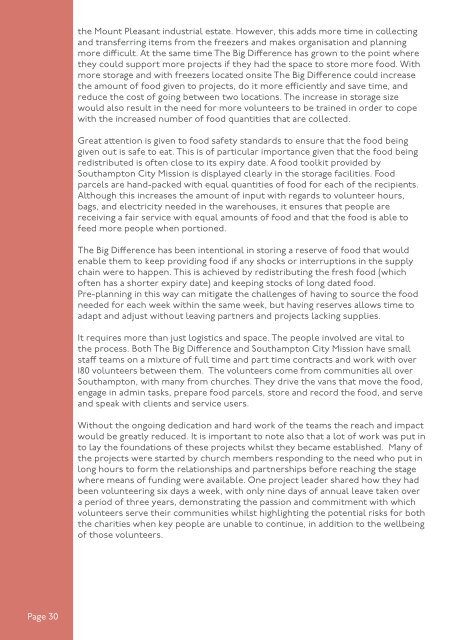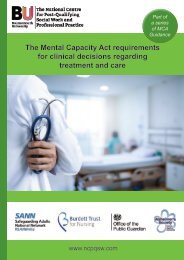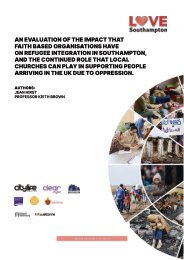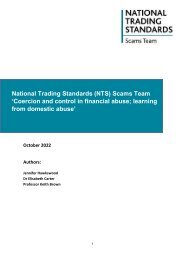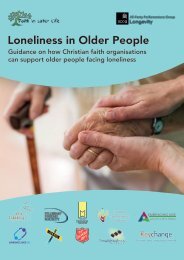Love Southampton Food Report
The headline results are simply staggering. Over 1.4 million meals were distributed in a year, equivalent to £5.8 million worth of food, delivered by 18,720 hours of work by volunteers. Moreover, this support has moved from emergency food aid to become a critical service in the support of the most marginalised in our society. There is clear evidence that children in schools struggle to concentrate during a school day without this provision simply because they are hungry.
The headline results are simply staggering. Over 1.4 million meals were distributed in a year,
equivalent to £5.8 million worth of food, delivered by 18,720 hours of work by volunteers.
Moreover, this support has moved from emergency food aid to become a critical service in
the support of the most marginalised in our society. There is clear evidence that children in
schools struggle to concentrate during a school day without this provision simply because
they are hungry.
You also want an ePaper? Increase the reach of your titles
YUMPU automatically turns print PDFs into web optimized ePapers that Google loves.
the Mount Pleasant industrial estate. However, this adds more time in collecting<br />
and transferring items from the freezers and makes organisation and planning<br />
more difficult. At the same time The Big Difference has grown to the point where<br />
they could support more projects if they had the space to store more food. With<br />
more storage and with freezers located onsite The Big Difference could increase<br />
the amount of food given to projects, do it more efficiently and save time, and<br />
reduce the cost of going between two locations. The increase in storage size<br />
would also result in the need for more volunteers to be trained in order to cope<br />
with the increased number of food quantities that are collected.<br />
Great attention is given to food safety standards to ensure that the food being<br />
given out is safe to eat. This is of particular importance given that the food being<br />
redistributed is often close to its expiry date. A food toolkit provided by<br />
<strong>Southampton</strong> City Mission is displayed clearly in the storage facilities. <strong>Food</strong><br />
parcels are hand-packed with equal quantities of food for each of the recipients.<br />
Although this increases the amount of input with regards to volunteer hours,<br />
bags, and electricity needed in the warehouses, it ensures that people are<br />
receiving a fair service with equal amounts of food and that the food is able to<br />
feed more people when portioned.<br />
The Big Difference has been intentional in storing a reserve of food that would<br />
enable them to keep providing food if any shocks or interruptions in the supply<br />
chain were to happen. This is achieved by redistributing the fresh food (which<br />
often has a shorter expiry date) and keeping stocks of long dated food.<br />
Pre-planning in this way can mitigate the challenges of having to source the food<br />
needed for each week within the same week, but having reserves allows time to<br />
adapt and adjust without leaving partners and projects lacking supplies.<br />
It requires more than just logistics and space. The people involved are vital to<br />
the process. Both The Big Difference and <strong>Southampton</strong> City Mission have small<br />
staff teams on a mixture of full time and part time contracts and work with over<br />
180 volunteers between them. The volunteers come from communities all over<br />
<strong>Southampton</strong>, with many from churches. They drive the vans that move the food,<br />
engage in admin tasks, prepare food parcels, store and record the food, and serve<br />
and speak with clients and service users.<br />
Without the ongoing dedication and hard work of the teams the reach and impact<br />
would be greatly reduced. It is important to note also that a lot of work was put in<br />
to lay the foundations of these projects whilst they became established. Many of<br />
the projects were started by church members responding to the need who put in<br />
long hours to form the relationships and partnerships before reaching the stage<br />
where means of funding were available. One project leader shared how they had<br />
been volunteering six days a week, with only nine days of annual leave taken over<br />
a period of three years, demonstrating the passion and commitment with which<br />
volunteers serve their communities whilst highlighting the potential risks for both<br />
the charities when key people are unable to continue, in addition to the wellbeing<br />
of those volunteers.<br />
Page 30


